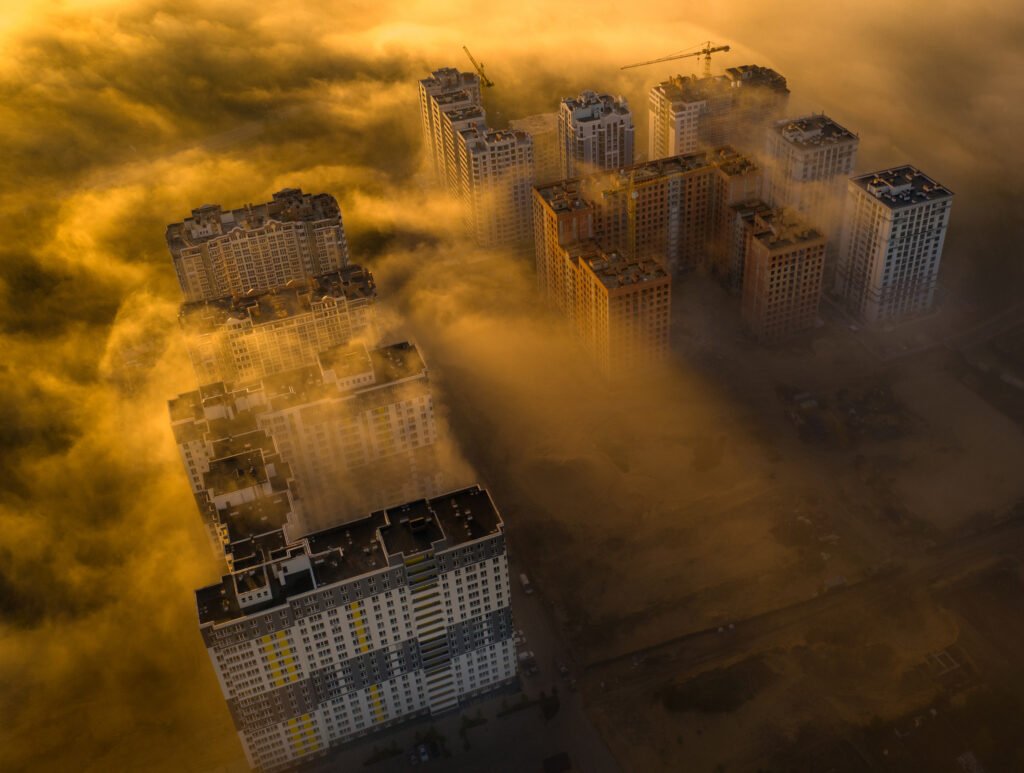The China real estate crisis has revealed cracks in the broader Chinese economy. Global markets are feeling the reverberation from the Far Eastern economic earthquake. Here’s how the fallout will impact the US economy — and what to do to protect yourself.
What’s happening in China’s real estate market?
For more than three decades, demand for housing in growing cities fueled an unprecedented construction boom. It started with the growth of the Chinese middle class, with more people moving from the rural countryside into modern apartment buildings.
Since property developers couldn’t build homes fast enough, they took advantage of cheap money by selling pre-construction homes to help fund the projects. Homebuyers willingly took out loans to pay for apartments before they were built because they saw real estate as a way to build wealth quickly.

The rise of large construction projects also meant strong demand for related jobs. Painters, cement makers, contractors, real estate agents, and other suppliers thrived in the real estate bubble. About 25% of the entire Chinese economy was dedicated to the real estate sector.
Government lockdowns and speculation crackdowns
When the pandemic hit, Chinese consumers were put on “zero Covid” lockdowns for years. With factories closed and nowhere to go, there was also nothing to spend money on except groceries and essentials.
At the same time, government regulators started cracking down on speculative borrowing to keep the real estate bubble from bursting. It had the opposite effect, and real estate is on the brink of implosion.
The loss of inexpensive loans meant more developer defaults, and jobs tied to construction dried up. Consumers spent less because they had more money tied up in real estate. And many had mortgages on pre-construction homes that were never delivered. Real estate trusts staring at huge losses from risky investments that looked like they were a sure thing.
How bad is China’s crisis right now?
According to the official numbers, new home prices slipped for the second month in a row, off 2.4% from a high in August 2021. And existing home prices were down 6%.
However, the data from private sources paints a different picture. According to Bloomberg, China Real Estate Information Corp. reported that July new-home sales at China’s 100 biggest developers fell 33.1% from a year earlier, and they declined 28% in June.
There’s a growing concern among investors about timely and accurate real estate data, and many speculate that the country is purposefully under-reporting economic data for damage control.
In August, China stopped releasing unemployment data about its youngest citizens after joblessness among 16-24-year-olds reached record highs of over 21% for two consecutive months.

Chinese developers default on outstanding debt
China Evergrande was one of the largest to start defaulting on debts in late 2021. The real estate developer defaulted on $335 billion in debt and filed for bankruptcy protection in the US. Trading of China Evergrande shares was halted for 17 months. When they resumed on August 28, they had lost 79% of their market value or $2.2 billion.
Country Garden is the next real estate developer that is on the brink of collapse. Presales of unfinished units have fallen 50% in June and July, which is twice the rate of decline in the preceding five months.
In August, Country Garden missed two interest payments, and it is at risk of filing bankruptcy with $187 billion in debt. Its bonds are now trading for pennies on the dollar, and its shares are selling for less than HK$1, down from HK$17 five years ago.
Chinese regulators are now trying to backpedal and right the market. Whether their efforts will work is yet to be determined.
On Thursday, August 31, The People’s Bank of China (PBOC) and the National Administration of Financial Regulation (NAFR) announced that minimum down payments for mortgages will be cut to 20% for first-time buyers and 30% for second-time buyers nationwide. In addition, interest rates on existing mortgages could be renegotiated starting September 25.
China real estate shockwaves hit throughout Asia
Countries that rely on Chinese demand for their goods and services are starting to feel the pain.
South Korea’s exports fell in steeply July, led by smaller shipments of computer chips to China. And according to purchasing managers’ indices, factory activity fell for the 14th consecutive month.
Japan’s factory activity has also dropped for the 5th month in a row.
Vietnam, a key exporter of garments and textiles, footwear and wood items as well as electronics, reported that second-quarter exports fell 14% from a year earlier.
Thailand’s economy grew at a slower-than-expected pace of 1.8% in the second quarter of 2023, in part due to lower levels of Chinese tourism.
The next markets that may be affected are Singapore and Hong Kong, since they rely on demand from China, with 9% and 13% attributed to GDP respectively.
What the China real estate crisis means for US investors
America’s trade relations with China have been strained since the US government imposed tariffs on Chinese goods. In addition, China has become more friendly with Russia, which has further strained relations with the US.
While the US has started bringing more manufacturing stateside, several large American companies rely on China. For example, Apple, Ford, Tesla, and Intel all use Chinese manufacturing to produce their products.

Entertainment and gambling companies such as Las Vegas Sands, MGM Resorts, and Wynn Resorts will be affected by the slowdown since they rely on Chinese tourism.
How to safeguard your investments
Considering the uncertainty in global markets, it would be prudent to diversify your holdings. Minimize overexposure to risky equities and global economies, which will see a downturn should China’s real estate market implode.
You can always add more layers of protection to your portfolio by increasing your gold and precious metals investments. They provide insurance against market market, a hedge against inflation, and most importantly, peace of mind in uncertain times.
Request a Portfolio Review
The best way to see how precious metals fit into your portfolio right now is to book a no-pressure portfolio review with your precious metals advisor. Your advisor can advise on the best strategy for your objectives — which precious metals to purchase, how much you should hold, and when to make strategic ratio trades.
And your portfolio review will help you see how well your current investments are positioned to weather market volatility. You can download the market readiness worksheet and request your portfolio review below.
















